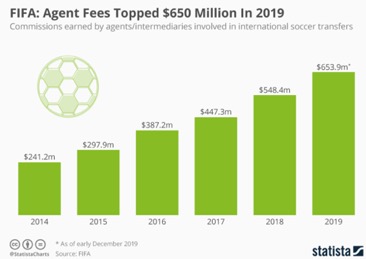As part of FIFA’s deregulation of agents in 2015 they removed the compulsory agent exam. The exam lasted 75 minutes and consisted of 20 multiple choice questions based upon various case studies and scenarios. 15 of these questions came from FIFA directly and the other five were created by the national football association. The exam was available in the local language of the national football association. The aim was to test the candidate’s understanding of FIFA’s principles and to appropriately apply the regulations in different situations. In order for the candidate to be awarded an agent’s license, they were required to achieve 80% on the exam; a total of 16 correct answers out of a possible 20. It was a difficult exam that forced aspiring agents to vigorously examine and understand all of FIFA’s regulations, from player registration to transfers and status of players. The exam was not to be underestimated, reflected in just an 8-15% annual pass rate. Consequently, agent numbers were hardly booming. Prior to the deregulation in 2015, there was only around 500 licensed agents operating in the UK, according to The Independent.
Then, from the April 2015, the exam was abolished as part of FIFA’s changes to agent regulations in an attempt to improve the industry and football as a whole. The motivation for deregulation was in the hope that transparency would increase as all agents would become licensed. Previously, those that could not or did not want to pass the exam resorted to operating without a license, making it difficult for FIFA to monitor. They decided it was best to leave the responsibility of deciding how to award an agency license to the independent national football associations. In some countries, such as France and Italy, an exam was still used, combining FIFA’s and the independent football associations’ regulations. However, in other countries such as the UK and Germany, the absence of an exam reduced the criteria for obtaining an agent license to a criminal record check and an affordable annual payment.
The Independent now estimates the number of licensed agents in the UK to be around 6000 individuals, a 1200% increase from the time when passing the FIFA exam was mandatory. This is an extraordinary rise in the number of agents under the umbrella of the FA. This was not exclusively seen in the UK; it had the same impact on the football industry worldwide. The table below shows the rising agency fees across the football world (Statista, FIFA). The table may give the false impression that because there are more agents, they create more commission. The reality is that the rising agent fees are what is attracting the large rise in numbers but many find that they are unable to make money. FIFA has recognised this and is planning on limiting the number of new agents to prevent a further increase.

Inevitably, with a wider range of individuals involved in the industry that have not proven a certain standard of knowledge and education, the average competency of agents has fallen. FIFA have decided to reevaluate their regulations for working with intermediaries (RWI) and are proposing to reintroduce an agent exam in order to combat this issue. According to FIFA’s Chief Legal and Compliance Officer (CLCO) they are in the final stages of consultation with all the relevant parties. The final proposal is set to be made in the near future, before the new regulations will come into effect in the summer of 2022. The CLCO has made it very clear that this is not intended to be a project to oppose agents but to help them by improving the standard within the industry. FIFA are also determined to ensure that the new regulations comply with EU legislation and that the exam can be introduced globally.
From what is known so far, the exam will likely take a slightly altered appearance to the one that was scrapped in 2015. All of the multiple-choice questions will be universally applicable, based upon FIFA regulations. It will also change from being translated into any language to only being available in four languages, English, Spanish, French and German. The exam will be taken digitally rather than on paper. This allows FIFA to have more control and prevent cheating. The pass mark is yet to be officially stated but it is likely to be around 80%.
Reintroducing an exam will, first and foremost, decrease the number of licensed agents operating in football. However, there are many other advantages to the proposed system. By making candidates educate themselves and reach a certain level of knowledge and wisdom of the industry in order to become a part of it, the standard and expertise of agents will improve. With better educated agents should come more transparency, and with greater competency comes greater professionalism. It is hoped that the proposal will therefore benefit the agents themselves as well as the players and football in general.
I expect that FIFA will consider and attempt to overcome any issues that their new exam proposal may endure to ensure that it is a success. The exam was originally eradicated in 2015 on the (since falsified) belief that it would increase the transparency of the industry by reducing the number of unlicensed agents. Whilst it is not disputed that the standard of agents that pass the exam will increase, will there not just be a rise in unlicensed agents once again? It seems a vicious circle that poses a difficult solution. If the exam is to be reintroduced how can the risk of losing transparency or a level of control over the industry be minimised?
Furthermore, there is the unavoidable issue of the ‘unexamined agents’. Although those that passed the exam prior to 2015 will not have to retake the new exam, what is the best approach to have with the agents that obtained their license since 2015 by passing the fit person check and are paying their annual fee? If FIFA were to demand that these agents now pass an exam, there will be objections from this cohort. These agents may have worked for up to six years, developing their client base and operating within the industry. If they are then unable to pass the new exam their livelihood will be undermined. It makes sense that these agents should need to pass an exam, but it would be fair to individuals in this position to be allowed multiple retakes and extra access to formalised education in order to help them to pass it.
In my opinion, education should be paramount, and should be expanded and developed with a greater volume of content that is specific to the work of agents. For an agent to be successful and professional they must have a wider understanding of all regulations, case studies, cultures, systems, history, leagues, legislation and every facet and field of the industry. It is expected that an ongoing education system will be provided by FIFA that will inevitably produce a greater and constantly growing level of proficiency amongst agents.
In conclusion, I support the implementation and reintroduction of a formal, universally applicable FIFA exam. It sets a single standard of competency for agents to meet to obtain their license. FIFA will structure the exam in a manner that demands candidates to have an adequately detailed understanding of the industry and its regulations. This will place a distinct stress on agents educating themselves which will have a positive impact on the football world.

